- Home
- Cynthia Voigt
Dicey's Song Page 3
Dicey's Song Read online
Page 3
The first pale stars were coming out. It was the dark of the moon, so the stars burned brighter, especially the evening star, hanging just over the horizon. Dicey knew she should get back inside and send Maybeth and Sammy up to bed. But she didn’t want to and maybe she wouldn’t.
She lay on her back along the dock and looked up at the stars. The sky was turning black and the stars burned out there, unchanging. All those stars, and those dark millions of light years . . . Dicey wondered if the space between was to push the stars apart or hold them together.
She jumped up impatiently. That was James’s kind of idea, and when she started having ideas like that it was time to get back inside.
When she returned to the house, only James was still in the living room. “Where are the little kids?” Dicey asked.
“They went to bed, half an hour ago. They’re asleep; Gram tucked them in and went up to check later.”
“You should have called me.”
“Gram said maybe you wanted to be off on your own. She said you put in a long, hard summer with all of us, and we should remember that you might want to get away once in a while.”
Dicey didn’t know what to answer. She was surprised to hear that Gram understood that, but still — she almost wished Sammy and Maybeth hadn’t wanted to go to bed without saying good night to her.
James had his face back in the book. “Am I bothering you?” Dicey asked. He shook his head, but his eyes were asking her questions. “Is something wrong?”
He put his eyes back on the page. “I’m just wondering how things are going to go for us this year. And for me. I mean, it’s not as if we were her real children — and at school too. What if it doesn’t work out?”
“She’s going to adopt us, you heard her. She wants to, she likes us,” Dicey said. “She put us down in the Bible.”
“I know,” James said. “But Dicey? You never understand, because it’s always so easy for you, you just go ahead and do what you want. And Sammy, too, and everybody likes Maybeth. And I think Sammy must remind her of our Uncle Bullet.”
“What are you talking about?” Dicey demanded.
“But I never fit in, not at Provincetown, or coming down here if you think about it. I think about it.”
“But you did, we did it together,” Dicey pointed out. The trouble with James was he thought too much about things.
“Some people, they’re always outsiders, wherever they are.”
“So am I,” Dicey told him, finally understanding what he was worrying about.
“Yeah, but you don’t care,” James said.
Dicey couldn’t argue with him about that. “I wouldn’t worry, about it, James,” she advised.
“Why not?” he asked.
“Because it won’t do any good,” Dicey snapped.
He didn’t believe her, she could tell. She didn’t let that bother her. She just picked up one of the books on boat building and went up to read in bed.
During the next week, Dicey settled herself into a routine. She rode her bike to school (the little kids took the bus, which stopped for them right by Gram’s mailbox), sat through classes, and spent an hour exactly in Millie’s store. Except for the windows, the difference Dicey’s work made didn’t show much the first week. But after she’d spent three hours on Saturday morning washing down the floors, the store really did look cleaner, more like a place where you would like to buy food.
Dicey had planned out her work at the store, what to do first, second, third, during the long, slow school days, going from science to math to social studies to gym to English to home ec. The only class she couldn’t think in was home ec, because there you had to do things. Stupid things, Dicey reported to James. They were starting with sewing, buttons first. It wasn’t interesting, but you had to watch what you were doing or you attracted Miss Eversleigh’s attention and she would come stand behind you at the long table, explaining over again all the boring things you had already listened to, how to thread a needle and tie the knot, how to position the button and lock it in place, boring-boring-boring. Dicey had more important things to think about. Miss Eversleigh might care about that stuff, that was her business, and Dicey guessed the tall, bony, white-haired woman didn’t have anything better to do. But Dicey had much better things to do. She had her own routine.
When she rode home from her job, Dicey would work for an hour on the boat, scraping off the old layers of paint, before going inside to help Gram with supper or some other housework. After supper, she would listen to Maybeth read for a while and help her review the lists of words. Then she would dash off the busy work her teachers gave as homework and spend an hour studying the boat books.
On Sunday, Gram asked Dicey to give her some advice about the papers and pamphlets she had been given at the Welfare Office and by the lawyer. “I can’t figure these forms out,” Gram said, irritated. She had them all spread in front of her, covering half the long kitchen table. “So you’re going to have to put your nose into them and help me, girl.”
If Gram needed her help, that was fine with Dicey. And if she couldn’t figure things out, she could always enlist James’s aid. “Between us,” she promised Gram, “we can do anything.”
“Humph,” Gram said. “I hope you’re not counting on that.”
Dicey met her grandmother’s eyes, across the table. “You do it too, don’t you?” she asked. “Worrying,” she explained.
“Doesn’t hurt to be prepared,” Gram said. “I’ve never taken charity, never wanted to. I don’t expect to enjoy the experience, don’t expect it to be easy. I like to be prepared for the worst. It saves trouble.”
Dicey remembered that the next Wednesday, when Maybeth came home from school with a note. As Dicey walked over from putting her bike away in the barn, she saw Gram shucking the last ears of corn from the garden. Gram sat on the back steps with her toes dug into the sun-warmed dirt. “Something on the table you should look at,” Gram told her.
Dicey knew what it was before she picked it up. A note from Maybeth’s teacher. Maybeth was always coming home with notes from her teacher, saying could they please have a conference, not saying what they wanted to confer about. In Dicey’s experience, what they wanted to talk about was what to do about Maybeth being so slow, about how they wanted to put her back a grade, which wasn’t doing anything as far as Dicey could tell. Only the nun at the day camp in Bridgeport that summer had talked about really doing something. But what she wanted to do was send Maybeth to a special school for retarded people. Dicey didn’t believe Maybeth was retarded, not the way she could learn music, the melodies and the words. But Dicey couldn’t be sure; how could she be sure? She made herself pick up the piece of paper from the table.
She took the folded paper outside to sit beside Gram while she read it. It was from Maybeth’s music teacher, asking Gram to come in for a meeting, the next day, at three fifteen, as soon as school let out. “But Maybeth can sing,” Dicey protested. “She never had a note from her music teacher before,” Dicey told Gram.
“I don’t know,” Gram said. Her fingers pulled the long protective leaves from the ears of corn. This late in the season, half of the ears in her pile were too wormy to eat. Those she tossed into a mound on a brown paper bag. “I don’t know what this young man is in such a hurry for.”
“I’m sorry,” Dicey said. “I’ll go in and see him before work.”
“I’ll go,” Gram told her quickly. “I was planning to. I’m the one who should, anyway, I’m the name that’s on their thousands of forms.”
Dicey was so relieved she didn’t know what to say. Instead, she picked up an ear and started pulling off the leaves. “I’m sorry,” she said again.
“You don’t look it,” Gram observed.
Dicey looked up at her grandmother’s face. Gram rewarded her with a sudden smile and spoke briskly. “You’re not the only one responsible, girl. You’ve been responsible a long time and done a good job. Take a rest now.”
Dicey nodded her
head and that was that. She finished the corn and dropped the husks into the garbage can on her way out to work on the sailboat.
CHAPTER 2
DICEY SWALLOWED back a yawn and looked out the window. It was close and hot in the classroom, just like every other classroom she had ever been in. The windows were open, the temperature was almost ninety, the grass on the front lawn of the old brick school building was dry and brown. The building, which housed all the grades from seven through twelve, had been built like a double decker U; from her window Dicey could see the front entrance, the long sidewalk, and the empty street. No breeze stirred the leaves on the big oaks that marked the front of the schoolyard. Their leaves drooped down, dis-spirited by the heat, and hung there. Like dogs’ tongues, Dicey thought, and pictured the tree panting with many tiny tongues, maybe even dripping saliva the way a dog’s would. She felt a smile wash over her face.
Lazily, she brought her eyes back into the classroom. Like every classroom she had ever been in, it had long, many-paned windows and a wall of green chalkboard at the front. At the back was a wall of bulletin board, so close behind her she could reach back and touch it if she wanted to. The students’ desks made a square, six by six, and Dicey was sitting where she always did, back in the far left-hand corner, next to the windows. Her desk had a kind of tray attached to it, to write on, and a rack under the seat for her books. She had an English textbook open in front of her and the teacher, Mr. Chappelle, was introducing the next unit of study. They’d spent the first three weeks on diagramming and now they were going to read some stories. Dicey was sorry the diagramming was finished. She liked the precision of it. Besides, it was easy.
“Conflict,” was written on the board in Mr. Chappelle’s square printing. He couldn’t write on a straight line. He was young and skinny and had carroty red hair that he kept trying to brush flat with his hands, but it always popped back up. He always wore a suit and tie. He had a pale face: pale blue eyes, pale skin, even his freckles were pale brown. He was one of those teachers who taught standing up, but he didn’t move around much, just stood in front of the chalkboard. He had pushed the big teacher’s desk over to the side of the room, so there was a clear space in front of the board. He always rolled a piece of chalk in his fingers. On the first day of class, he had introduced himself as the English and Drama teacher. In Dicey’s opinion, he wasn’t very dramatic.
“If we define conflict as requiring two opposing forces, what might we look for?” he asked the class. “For how conflict might appear,” he added. “In what forms,” he added. “In a story,” he added.
There were always a couple of people who put their hands up right away, usually girls, usually from the town kids who dressed up for school. They sat in the front of every class, boys and girls together. Then, the blacks sat together, some of them at the front and some right behind. The country kids, which included the watermen’s families, as far as Dicey could tell from overhead conversations about the crab catchers and the fishing season and oyster beds, sat in the middle and back.
Nobody sat near Dicey, who sat alone. She scratched at the shoulder of her T-shirt and waited to hear how stupid the answers to the question would be. There was only one other person in the class who thought of interesting answers, and that was a black girl who sat in the front row, diagonally across from Dicey. This girl usually waited until all the stupid guesses had been made before she raised her hand. Dicey never raised her hand, but if Mr. Chappelle asked her she’d answer.
The black girl looked about eighteen, with a full bosom and long muscular legs and round hips. She wore a denim jumper, the kind some of the town gifts wore, and different blouses, and stockings with low-heeled shoes. Her hair was a short afro and her face looked lively. The eyes especially, dark brown and liquid, but also her mouth, which was always moving, since she had a lot of friends. Most often she was talking, or laughing. Wilhemina was her name.
Every now and then, this Wilhemina would catch Dicey’s eye in class (they had three classes together, English and home ec and science) and Dicey wondered what she was thinking then. Wondered if she wasn’t thinking something interesting.
Dicey leaned back and waited to see what the answers to Mr. Chappelle’s question would be. Vaguely, she thought about the scraping of the boat she planned to accomplish that afternoon.
“Conflict between two men,” the answers began. Mr. Chappelle wrote two men on the board. Since it was correct, a whole lot of hands went up. “A woman and a woman.” “A man and a woman?” “A boy and a boy?” “A gift and a girl.” The predictable list went on. Mr. Chappelle wrote everything on the board. Dicey made her own list, inside her head, because you could have conflict between someone with power and someone without any, between someone honest and a liar. The voices petered out around her as she continued with her own thoughts. You could even, she realized, have a conflict between somebody and himself: and that was an interesting idea. Like Gram, Gram was like that.
Wilhemina had her hand up, and Mr. Chappelle was waiting until the rest of the class settled down (“A man and his dog?”) to call on her. “Yes, Wilhemina?”
The rich voice spoke out. “What about conflict between an individual and the society he lives in?”
Dicey usually kept her eyes down on the fake wood surface of her desk, but this caused her to swivel her head up. She tried to think out what it might mean. There were questions she would have liked to ask the black girl. She caught Wilhemina’s eyes on her face, as if the girl were aware of Dicey’s reaction. Mr. Chappelle wrote out the letters on the board, slowly, as if he was thinking.
“What do you mean by that, Wilhemina?” Mr. Chappelle asked.
“Well,” the girl began. Dicey couldn’t stop herself from leaning forward in her seat. “A lot of the time, conflicts are between one person and the people he lives with. Or she lives with. If the society thinks one way and the person thinks another.”
Mr. Chappelle was listening carefully, you could tell. Dicey figured, from the way he wrote down everything everybody said, even when it repeated the same basic idea, that his brain didn’t work very fast. “Can you give us any examples?”
The rest of the class shifted in their seats, getting bored. Too bad for them, Dicey thought to herself.
“Jesus, for one,” the girl answered quickly, “and St. Paul, and John the Baptist. St. Joan, maybe. And even Moses, if you think about it.”
“We know your daddy’s the minister,” somebody muttered, and Wilhemina turned around and smiled, not taking offense.
“Then what about the suffragettes?” she suggested. “Everybody laughed at them, and they went to jail and had food pumped into their stomach when they refused to eat and a lot of them were disowned by their families. Or Louis Pasteur, everybody thought he was crazy. Or the people who ran the underground railways.”
Mr. Chappelle seemed to be thinking about all this, maybe trying to figure out what he should say.
“Yeah, but yours are all the good guys,” a boy from the town section called over.
“That’s right, Wilhemina,” Mr. Chappelle agreed. “Is society always wrong and the individual always right?”
“John Wilkes Booth,” Wilhelmina announced triumphantly. Dicey felt herself fill with laughter. Nobody else seemed to find it particularly funny. Mr. Chappelle harrumphed and turned his attention to the class.
“Dicey,” he inquired. “Do you have anything to add?”
Dicey chewed on her bottom lip, and why did he have to notice her. “Between someone and himself,” she said, not bothering to keep the anger at his intrusion out of her voice.
Mr. Chappelle kind of stared at her.
“I mean,” Dicey sat back, to show it couldn’t mean less to her what anybody thought of her idea, “sometimes you want one thing and the opposite at the same time. Or you say one thing when you really mean the opposite. Or there’s something you want to do and something you have to do.” She was getting warmed up, and she liked her idea.
<
br /> One of the town girls interrupted. “Like there are two boys and you like them both,” she said, then giggled.
Dicey closed her eyes briefly, then turned her attention back outside. If she hadn’t, just then, she would have missed seeing the straight-backed figure emerge from the main doors with a clumsy purse over its shoulder. Gram. Dicey couldn’t mistake that high carriage of the chin, or the unkempt curly gray hair. But her meeting about Maybeth wasn’t until three fifteen. What was Gram doing at Dicey’s school?
Mr. Chappelle, figuring (Dicey guessed) that the argument about whether or not you could like two boys best at the same time had gone on long enough, called on them to open their textbooks and start reading aloud the story that would be their homework. He told them which questions at the end they were supposed to write answers to, and then called on someone to read, one of the worst readers in the class, who stumbled over any word more than two syllables long and made sentences sound senseless because he never paid any attention to punctuation. People groaned and muttered to one another. Dicey looked quickly at the clock behind her. Only ten more minutes. Only one more class after this.
The bike rack was out behind the school building, by the parking lot. Dicey hurried out as soon as the bell released her from home ec class. (Who cared about the right way to pin up a hem, and she didn’t have any skirts anyway.) She was one of the first out. But not the first. A boy sat on the low concrete wall playing a guitar. He had black hair and wore a blue workshirt with its sleeves rolled up. He was playing a melody Dicey didn’t know. Dicey had never seen this boy before. He looked like an upper-classman, maybe a junior or senior. She stopped for a minute, to listen, because it sounded so good to her.
His fingers continued playing the song even though he sensed Dicey and looked up at her. He had wide gray eyes and dark, straight eyebrows, and a straight mouth. His thin face had a light tan. His eyes questioned Dicey.
“I never heard that song,” she said, to explain why she was standing staring.

 The Runner
The Runner By Any Name
By Any Name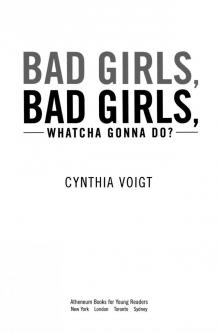 Bad Girls, Bad Girls, Whatcha Gonna Do?
Bad Girls, Bad Girls, Whatcha Gonna Do?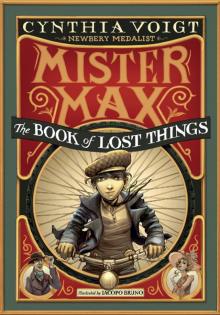 Mister Max: The Book of Lost Things: Mister Max 1
Mister Max: The Book of Lost Things: Mister Max 1 The Wings of a Falcon
The Wings of a Falcon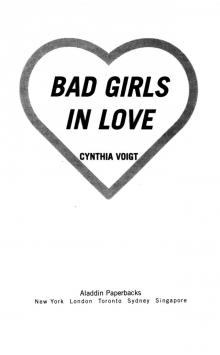 Bad Girls in Love
Bad Girls in Love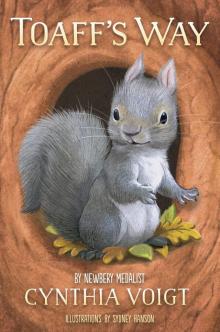 Toaff's Way
Toaff's Way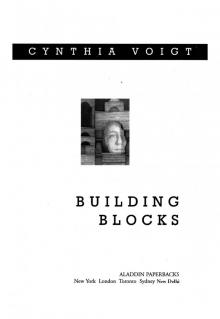 Building Blocks
Building Blocks Orfe
Orfe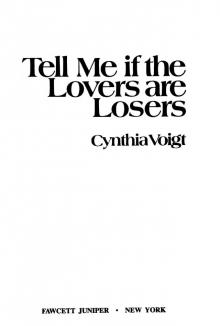 Tell Me if the Lovers Are Losers
Tell Me if the Lovers Are Losers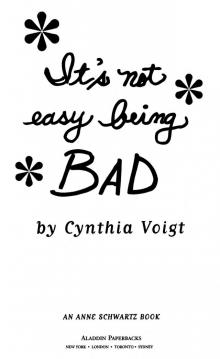 It's Not Easy Being Bad
It's Not Easy Being Bad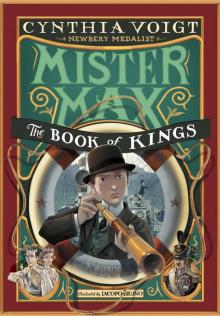 The Book of Kings
The Book of Kings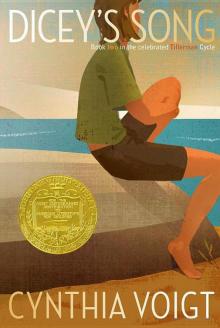 Dicey's Song
Dicey's Song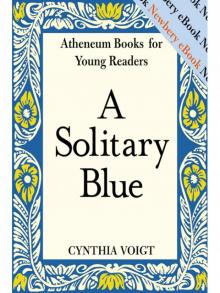 A Solitary Blue
A Solitary Blue Tree by Leaf
Tree by Leaf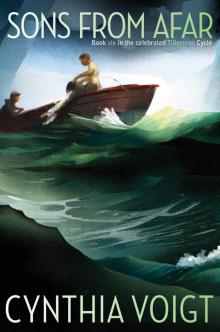 Sons From Afar
Sons From Afar Teddy & Co.
Teddy & Co. Jackaroo
Jackaroo Elske
Elske Izzy, Willy-Nilly
Izzy, Willy-Nilly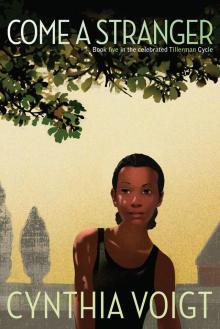 Come a Stranger
Come a Stranger Mister Max: The Book of Secrets: Mister Max 2
Mister Max: The Book of Secrets: Mister Max 2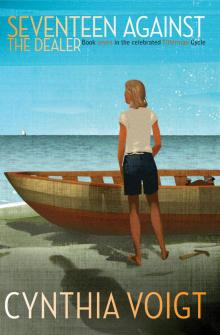 Seventeen Against the Dealer
Seventeen Against the Dealer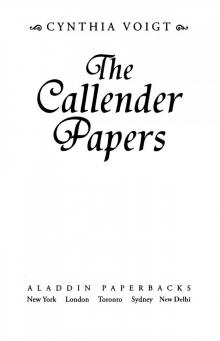 The Callender Papers
The Callender Papers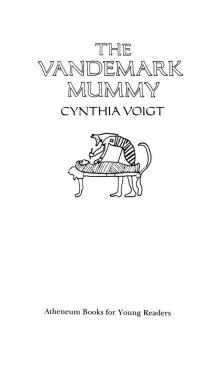 The Vandemark Mummy
The Vandemark Mummy Tale of Birle
Tale of Birle Glass Mountain
Glass Mountain The Tale of Oriel
The Tale of Oriel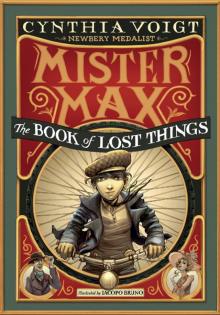 The Book of Lost Things
The Book of Lost Things The Book of Secrets
The Book of Secrets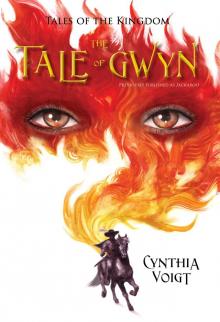 Tale of Gwyn
Tale of Gwyn